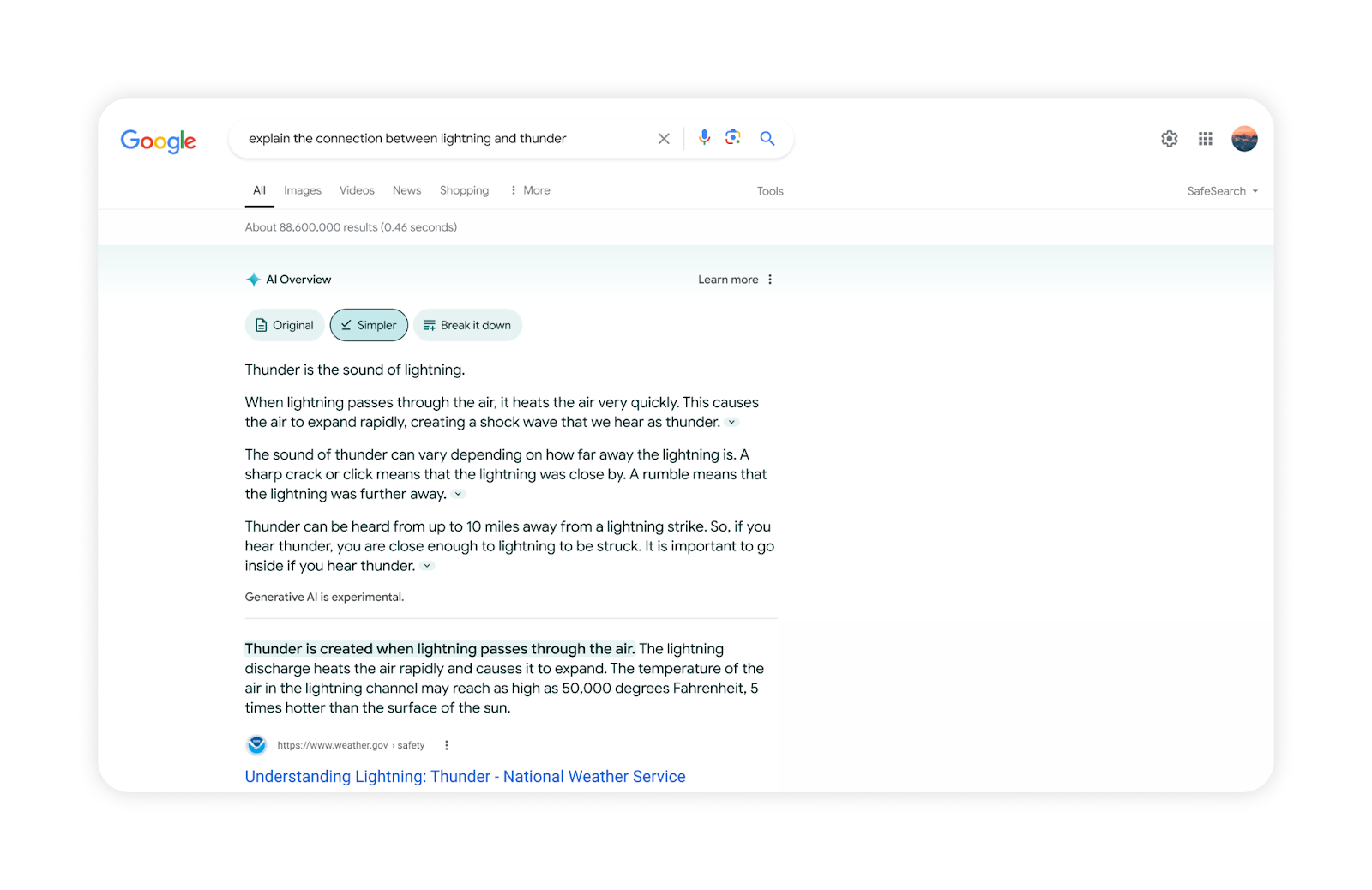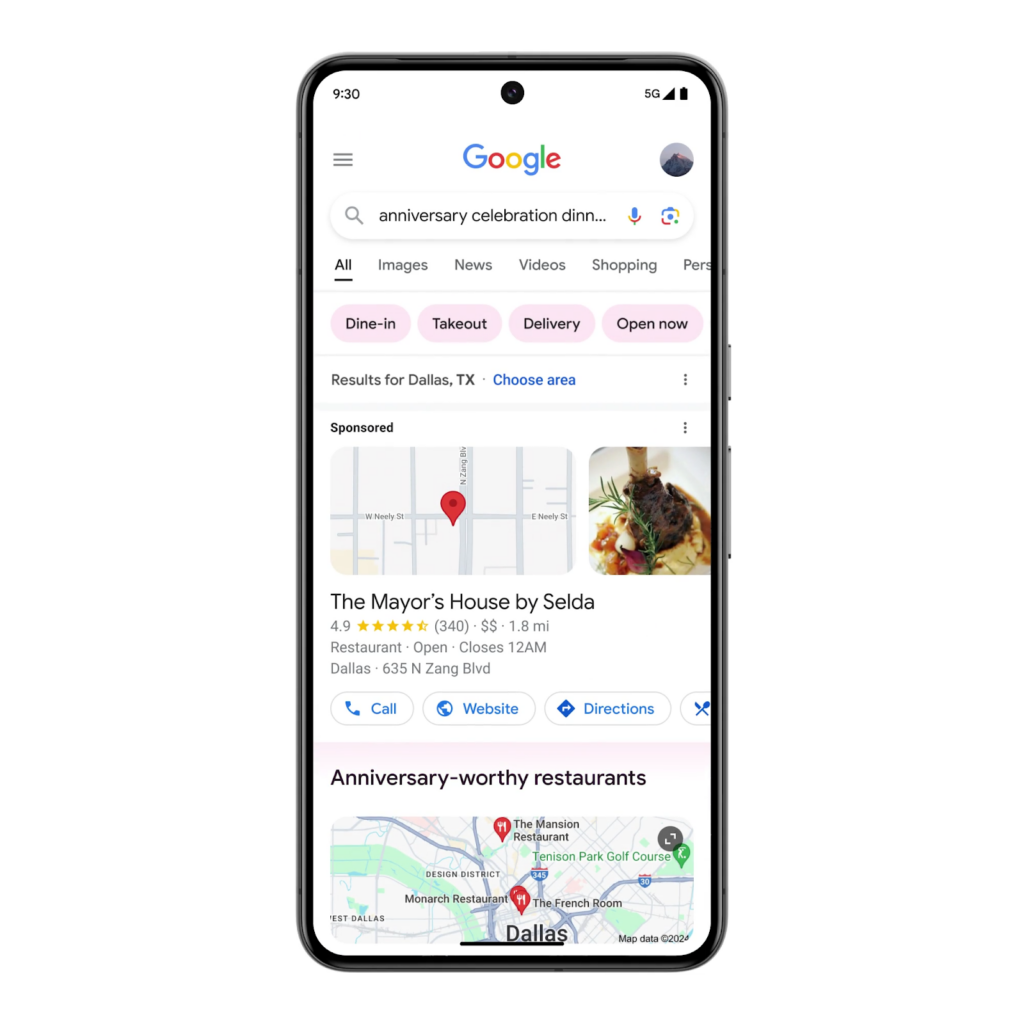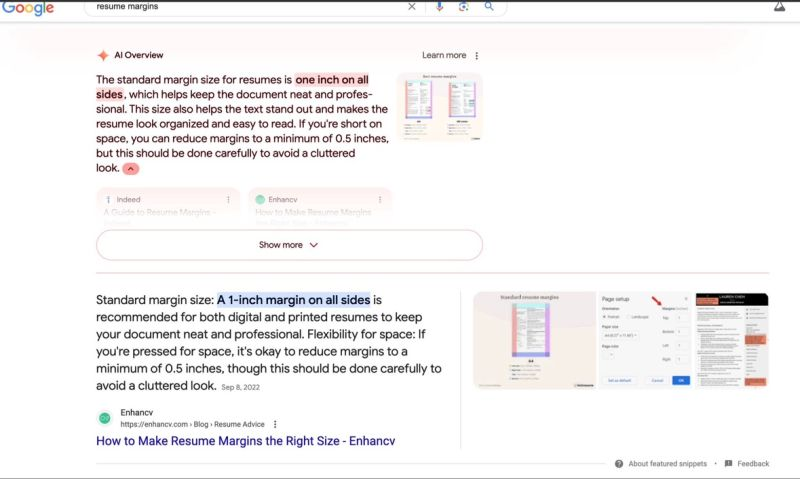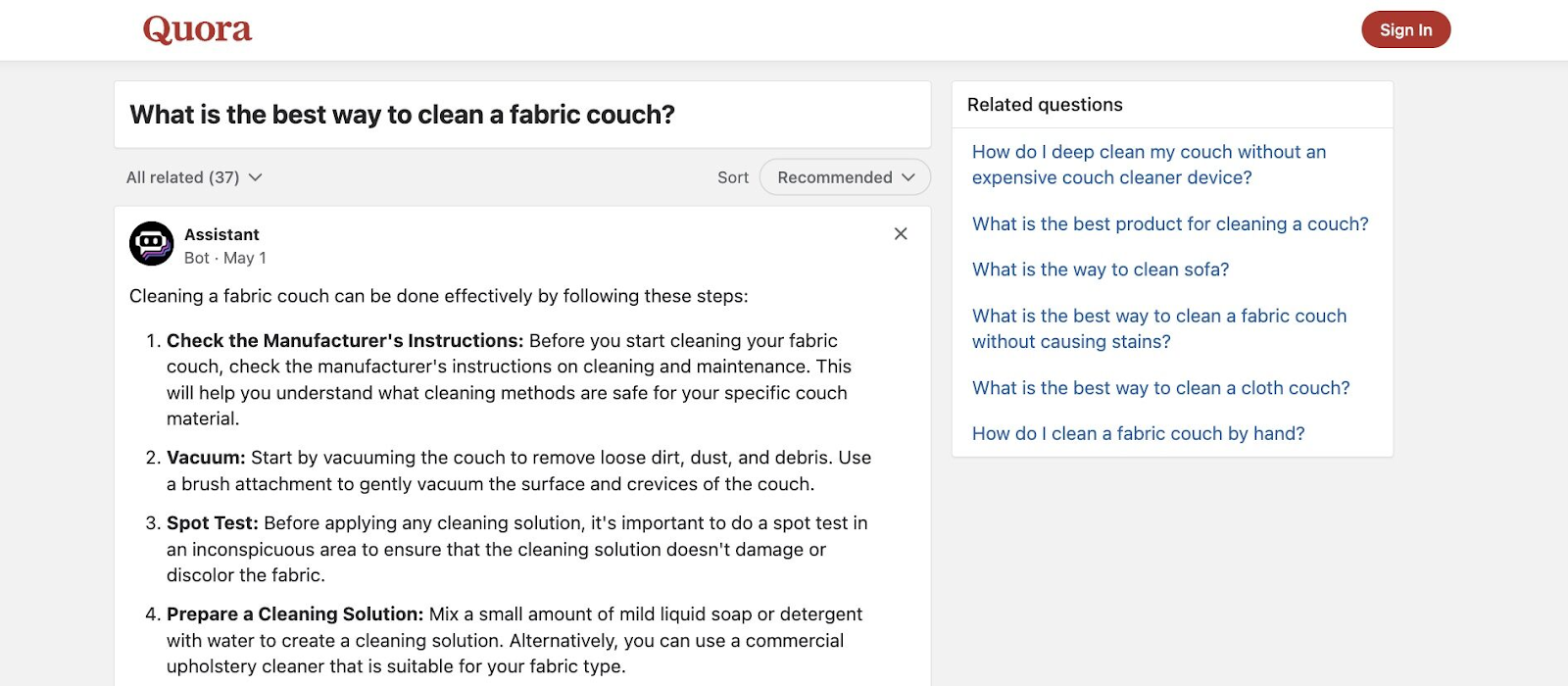Google I/O 2024 has set the stage for a new era of search, driven by powerful AI technologies, with the announcement that AI Overviews will be launched outside of Google Labs in the US as of 14th May 2024.
SGE, which was previously being tested across multiple countries in Google Labs, is being released into the wild which means that:
“Hundreds of millions of US searchers will gain access to AI overviews this week and over 1 billion by year’s end”.Liz Reid, VP, Head of Google Search
What Search-Related Announcements were made at Google I/O?
A slew of announcements were made that will redefine the search landscape as we know it, leveraging advanced AI and multimodal capabilities.



“We’ve added this after hearing from some that there are times when they’d prefer to just see links to web pages in their search results, such as if they’re looking for longer-form text documents, using a device with limited internet access, or those who just prefer text-based results shown separately from search features.”Danny Sullivan, Google’s Search Liaison
Will Google AI Overviews Improve Search?
Google has been testing Generative AI in Google Labs for just over a year accompanied by positive rhetoric. In a blog post yesterday Liz Reid wrote:
“People have already used AI Overviews billions of times through our experiment in Search Labs. They like that they can get both a quick overview of a topic and links to learn more. We’ve found that with AI Overviews, people use Search more, and are more satisfied with their results.”Liz Reid, VP, Head of Google Search
However, the reality is that AI Overviews, formerly Search Generative Experience, are still far from perfect. Many users and industry specialists have reported issues with the accuracy, helpfulness, and coherence of the generated responses.
“I didn’t actually expect Google to release their AI Overviews so fast because… in a very high share of scenarios still the answers give a much worse experience than traditional search results!”Aleyda Solis, SEO consultant, author and speaker
Evgeni Asenov noted an example (shown below) illustrating that problems that were prevalent in Google Labs testing still persist in AI Overviews rolled out to the general public.

Ironically, as Glen Allsopp shared, the examples that Google showed of AI Overviews in their official blog post and videos were from Quora which are –wait for it – also AI Generated.

It is fair to say that the general consensus among SEO experts is that, while advancements in generative AI are exciting and could be used to improve the Search Experience, what is being rolled out by Google is not yet ready for wider public consumption.
Following yesterday’s announcement, John Mueller followed up with his own relatively ‘meagre’ statement by highlighting a mechanism to allow websites to remove the link to their content within AI Overviews by using the nosnippet tag. This tag can already be used to prevent content from showing in the meta description/featured snippet in Google’s results. It feels like small lip-service to SEOs in a world where the quality of search is being thrown into question.
There are serious concerns that the quality of answers from search will be compromised and, in the worst cases, incorrect. It adds insult to injury because something that we know will likely have a detrimental impact on Organic performance for many brands and businesses is not yet fit for purpose. It seems an odd, unprepared, and pressure-driven move for a company that claims to put the users at its heart.
So, what do Generative AI Overviews mean for Search and SEO?
Google’s Hema Budaraju suggests that, similarly to Featured Snippets, AI Overviews generate a higher click-through rate than traditional search results. Although this may be the case, a higher CTR won’t count for much if you’re not visible in the AI Overview. Countless experiments that were conducted while AI Overviews were still a part of Google Labs indicate that Organic visibility and traffic will be heavily impacted by its introduction.
A few of the stats from these studies, including our own at Artefact, are below:
When will AI Overviews be shown?
Google will not share information about the percentage of queries that will generate an AI Overview, but we do know that they won’t be shown for all queries. As suggested above, it is likely that different verticals will see more AI Overviews than others based on the value they will add. They may be shown for financial, medical, and health queries – although ensuring total accuracy, by Google’s own standards, will be key.
Most examples suggest that, for the most part, AI Overviews will be shown for more complex, informational queries which can better be answered by a variety of different sources – calling into question whether AI Overviews and Ads will intersect in all the same ways they did before.
In her blog post yesterday Liz Reid referenced ads, albeit briefly: “As always, ads will continue to appear in dedicated slots throughout the page, with clear labeling to distinguish between organic and sponsored results.”
To me, this certainly suggests that there will be a crossover, although Google hasn’t given an explicit answer to this. In an article on Search Engine Land, Barry Shwartz wrote “I asked if we would see AI Overviews only when ads are not displayed, and I was told, that was not the case. The types of queries for which AI Overviews will show have “less to do with ads” and more to do with adding value to the search results”.

“As predicted at the Artefact AI Summit in London in May 2023 informational queries are now most at risk as Generative AI can provide better and faster user experience with more interaction. Most of the examples announced yesterday have shown that SERP pages will change for really long-tail complex questions. It is fair to assume that Google will focus on showing non GEN-AI answers for searchers who wish to complete an action, like purchasing goods, booking a hotel, renting car, etc.”
Edouard Destrem, Head of PPC at Artefact UK
Immediately prior to the introduction of AI Overview to search yesterday, research showed that their frequency has decreased and the amount of space that they take up in the SERP has also lessened. I think this indicates that Google, at least, wants to try to get it right. Although the Search giant may appear outwardly confident about the introduction of Generative AI to search, reducing the number of queries for which AI Overview is shown from 25% to 65% shows, at least an iota of, caution.
What Generative AI overviews mean for Search will be revealed in the coming weeks and months. Although studies have been conducted, the experience is now available “IRL” to a much broader audience . Its expertise, authority, trustworthiness, and accuracy will be tested by the people that matter most. As agencies supporting our clients, it’s our job to make sense of the data to accurately assess what this means to continue to provide the best experience to users.

“The rollout of SGE is possibly one of the least surprising things Google has announced for years – they’ve been openly testing and announcing iterations of the product. That being said, it’s likely going to come as a shock to many website and business owners in the coming weeks and months as search results and consumer interactions change. As SEOs, we can either panic about this or embrace it as the next step in the evolution of search.
Overall our strategies shouldn’t change, we should be thinking about the consumer, thinking about how people search and ultimately optimising to ensure people can get the information they need. Building a strong relationship with consumers, increasing brand awareness and targeting upper-funnel keywords should continue to play a key role in any search strategy, it’s just a case of acknowledging that the metrics and numbers we’ve seen historically may now shift in different directions.”
Ellen Blacow, Senior SEO Manager at Artefact UK
How can my business report on the impact of AI Overviews?
Impressions and Clicks for AI Overviews will be shown in Google Search Console, but Google has explicitly said that these metrics will not be identifiable from existing data.
This means that reporting on performance specifically for AI Overviews will be more difficult, but not impossible. There are plenty of tools available that will allow businesses to track and analyse the impact at a query level. Those who have been paying attention and are used to tracking more detailed Organic performance metrics may have a head start here — particularly those using more advanced reporting and attribution to understand the value of traffic from queries with more informational intent. It’s something that we’ve been working on understanding better in the last year.
Ultimately, when it comes to performance, tracking how changes in visibility and traffic correlate in impact to key business goals is what is important. The metrics that are truly important to our clients won’t change.
Tracking and understanding how this change to search impacts user behaviour, how the SERP changes by intent, nuances for specific verticals and across different product ranges will reveal how brands and businesses can pivot, if they need to at all, to achieve their unique goals.

“Whilst AI Overviews may feel quite familiar to industry professionals who’ve been provided access to the Search Generative Experience over the past year, we have to remember this feature will be a novelty to the majority of Google Search users. I imagine AI Overviews will continue to change quite substantially in the next few months as Google responds to full-scale user feedback, so I don’t believe the SEO industry should settle in too soon with their current presentation.
In my focus vertical, automotive, some of the greatest disruptions to organic search presentation have been recorded. A high number of search queries have AI Overviews appearing and the resulting sources presented in them differ substantially from the standard ‘10 blue links’. Our own research has confirmed this, though we see a much lesser impact on automotive brands themselves than we do on industry publications and third-party online marketplaces.
Brand power continues to provide visibility for manufacturers across the bulk of their top traffic driving search queries when AI Overviews are present. Greater impact is seen in non-brand early purchase funnel searches, where users are investigating their options and comparing features between equivalent models. For this reason, our primary recommendation for brands is to ensure they talk about their products in the language used by their customers and provide extensive information about each model on their websites.”
Andy Limn, SEO Director at Artefact UK
What can my business do to mitigate negative impacts from the introduction of AI Overviews?
There has been plenty of time to prepare for the introduction of Generative AI to Search – Google has given us a playground to test this. Adaptability is an invaluable part of the SEO skillset and so this is just another example of this.

“I’m expecting a knee-jerk reaction from brands that haven’t been keeping a close eye on developments, when they see a drop in organic traffic and don’t correlate it to the AI Overview rollout. It will be interesting to know how many searchers will use the new ‘web’ filter option to turn off AI overviews and make use of a stripped-down version of search results. Hopefully, we’ll have access to that data to monitor uptake.”
Nick Shread, Account Director at Artefact UK
We have continued to work with our clients to understand how we help them to achieve their broader business goals by improving their digital experience – taking new context and features into account. Employing tactics like:
I want to say the answer to this is simple. I want to say ‘make sure you are providing the best experience for your users and following best practice’ and in the long term, I still believe this is true. But, in the short term I fear that Google has made a departure from just this.
The introduction of AI Overviews to search has been preceded by months of turbulence and uncertainty in the search space. The impact of this has been devastating for some, even those businesses and brands who have had the right strategies in place and been providing good experiences to their customers.
If Google has been struggling to provide the best results to users in the old ‘normal’, how will it do that in the new one? I think we should buckle in for a bit of a wild ride as Google navigates this change to search and its product just as much as we do.

“As with everything Google related, this will very much be a wait-and-see situation to start with: no immediate panic and lots of analysing the available data before making any decisions. It feels like Google will use the US rollout to continue “testing”, and with more recent legal issues in the EU, those of us with European-based clients may have a little more time to learn and adapt.
I’m excited to see how this impacts brands in the travel sector though; how AI handles multiple content types – informational (journey information), supporting (mid-funnel interest) and converting (e-commerce) – will be interesting. Will it, and can it, tap into live journey information? Will users trust it to aid in a purchase??”
David Burkinshaw, Senior SEO Manager at Artefact UK

 BLOG
BLOG




